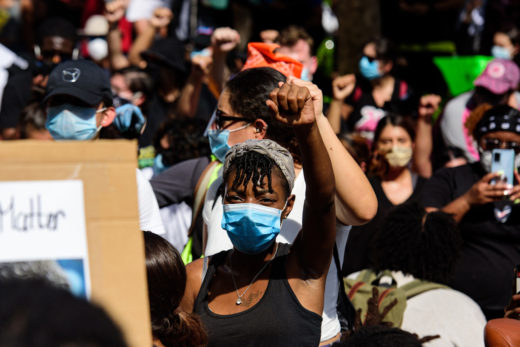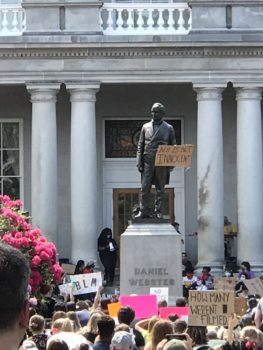 Higher education is a body that intends to be greater than the sum of its parts. The guiding principle is that college is a primary route to becoming an enlightened person capable of thriving in a society of opportunities and challenges. Over time, colleges have gone from providing only academic content to facilitating more opportunities for learning through personal engagement, systems to apply knowledge and realizing love of self. As with anything constructive, there are unintended consequences with negative impacts that we can’t always anticipate.
Higher education is a body that intends to be greater than the sum of its parts. The guiding principle is that college is a primary route to becoming an enlightened person capable of thriving in a society of opportunities and challenges. Over time, colleges have gone from providing only academic content to facilitating more opportunities for learning through personal engagement, systems to apply knowledge and realizing love of self. As with anything constructive, there are unintended consequences with negative impacts that we can’t always anticipate.
Consider the campus student who gained valuable experiences by becoming a leader in a Black women’s student group, but was not able to complete her undergraduate degree. As it becomes imperative to find a meaningful job, she is still less likely to be considered for that job than her peers who graduated but were not as involved in extracurriculars. The world is simply more disproportionately forgiving of those who’ve graduated, and we explicitly seek applicants with tangible credentials, period. Being a student leader, and what you’ve undeniably learned, just doesn’t matter that much unless you’ve also graduated. This seems to illustrate perfectly the very definition of a “decent person,” and how our society places greater moral value on someone who was simply diligent enough to complete a degree. Decent people are perceived as being more favorable people who are doing a decent enough job in life—they’re seen as doing their fair share.
Said decency often takes the route of touting her degree, often reflecting humanities courses in which she excelled as the reason why she is progressive, divergent from elitist attitudes historically steeped in the body of higher education. In other words, pushing people to be “decent” gives them the opportunity and perceived justification to believe in their own elitism, where they are able to hide behind their statuses as proud college alumni with neither introspection nor drive for lifelong learning. In some ways, it resembles looking into a cracked mirror and seeing the body of higher education as a false image with institutions as participants in a façade.
Is it possible that having a college degree is looting the human consciousness of its need and ability to unpack the path humans take to discover love and their life’s passion … and realize the need for lifelong learning? Has higher education told us that only those who do the work to finish the degree get to breathe freely?
We’re currently lost inside the pregnant pause of the COVID-19 pandemic and the exceptional emotions of the Black Lives Matter movement, as spawned by blatant systemic racism. Higher education carries a measure of power and duty to encourage, challenge and support the desire and will for each of us to critically self-reflect and correct. Even looking at ourselves in a cracked mirror still affords the time to take a deep breath and accept that we have not learned all that we can, that we do not love as much as we could. That mirror also shows the reflections of those around us; our instincts need to encourage them to do the same.
My far from monolithic relationship with higher education has recently made me start asking different questions amid different contexts. In particular, “Higher education, what have you done for me lately? What is a college degree doing for any of us?”
Maybe my clear and resolute question is derived from being a Black woman who is a highly reflective, Gen X, artistically inclined self-professed dork who probably thinks way too much about everything. Maybe it’s because, without ease, I earned both undergraduate and graduate degrees while working as a full-time staff member at some of the very institutions where I studied. Maybe it’s because even though I am the “decent person” there have been countless times where I’ve been valued for all the right reasons and also valued for all the wrong ones.
Even if I wanted to, I can’t hide behind my alumni status and stop learning. The rules are different for Black women. It’s notable. It’s noticeable. There are lessons to be shared. There are changes to be made by everyone. Look at yourself under the umbrella of higher education as a community-serving body … no matter where you stand underneath it … you need to worry less about staying insulated and dry. Seek the discomfort of being soggy. Drench yourself in the tears of others who are in pain simply because they don’t share the privilege of choosing to stay dry. Allow it to whet your appetite for love. Love and lifelong learning happen when we start to feel the pain of others.
Specifically …
Stop looting the dignity of Black people! We are already struggling to breathe—what else do we have left?
Stop hiding behind your relationship to higher education as a reason why you cannot possibly be implicated in ongoing systemic racism.
Stop blindly praising yourself—if you believe people need to be treated with respect, then actively work to end reprehensible and blatant disrespect the minute you see it happening.
Stop lying—start repeating to yourself on a loop that people of African descent really did build this nation without any access to education or even knowing how to read.
Stop believing that you are not a part of the problem. You are!
Stop loving what you have more than who you are. You are penniless without human love.
Stop thinking you know everything. You don’t!
Stop believing love is not the answer. It is. Love is the catalyst for lifelong learning and stillness.
Stop expecting change in an instant.
I’m not talking about the flick of a light switch. Although deliberate, flicking a switch is fleeting—always temporary and at will. We need change akin to sunlight, offering consistent ambient rays that always shine and will always return.
 In truth, a civil war is going on in this country and has been for 400 years. Higher education doesn’t always make that clear. What is often made clear are the rampant reasons we believe we have to justify our two-faced criticism of other nations for not having resolved their intense issues of civil unrest and ongoing turf wars. Through that, we promote the narrative that we are somehow different, better and regal. That narrative, the lies and the racist foundation upon which it is all built need to take a bow and exit stage left. That show is over! Higher education community members, are you going to do it? What will you do to help repair the damage? Will you heal shattered human dignity beyond resembling a looted storefront or will you wince and walk right by it? How will you show us love?
In truth, a civil war is going on in this country and has been for 400 years. Higher education doesn’t always make that clear. What is often made clear are the rampant reasons we believe we have to justify our two-faced criticism of other nations for not having resolved their intense issues of civil unrest and ongoing turf wars. Through that, we promote the narrative that we are somehow different, better and regal. That narrative, the lies and the racist foundation upon which it is all built need to take a bow and exit stage left. That show is over! Higher education community members, are you going to do it? What will you do to help repair the damage? Will you heal shattered human dignity beyond resembling a looted storefront or will you wince and walk right by it? How will you show us love?
That student who couldn’t finish her college degree but led the student group for Black women has endured enough.
Keisha Venson Sheedy is an innovation analyst with Southern New Hampshire University’s Innovation Center, delivering project management support for strategic initiatives that amplify the university’s dedication to access and equity in education. She previously worked in diverse roles in higher education at Plymouth State University, Granite State College, DePaul University and Columbia College Chicago. She is pursuing a Certificate in Creative Placemaking at the Institute of Art and Design at New England College, with particular interest in the evolving demographic identity and 2030 vision of Concord, N.H.
[ssba]

Excellent reflection on the progress of higher education and the progress that must still be made in pursuit of the truest form of human equality.